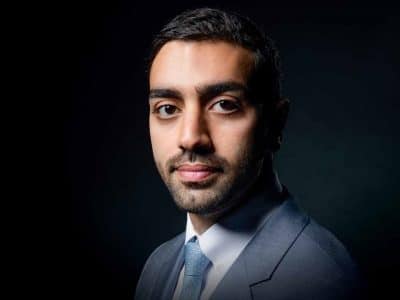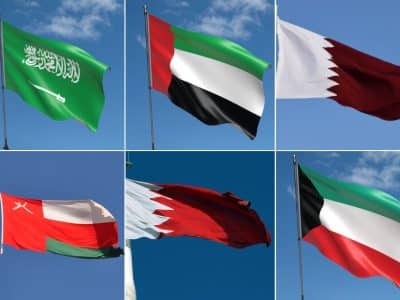Abdulla Qassem’s biggest headache is the speed at which his industry is changing.
“My current biggest competitor may not even be around in five years’ time,” he says. “There are always new entrants, and some of those new entrants are people you would never think would be in our industry.
“Either they don’t exist, or they are in a totally separate area. It’s changing so fast, it’s making it very attractive for new entrants to come in.”
That industry is the payments processing sector. And Network International, the undisputed regional market leader and the firm that Qassem chairs, is one of the fastest-growing outfits out there. The firm is 51 percent-owned by Emirates NBD, and saw “something in the range” of 15 percent growth last year, with the number of transactions processed hitting 600 million, amounting to around AED91bn ($24.8bn) in value.
“We consist of about 55-58 percent of the market in the UAE,” he says. “And it’s growing — because of smart government initiatives, and also because it’s the hub of a lot of airlines in the region. The airline industry is changing very fast, and on that area we are trying to capture as much of the market as we can.”
Qassem is an Emirates NBD veteran, having started at what was at that time Emirates Bank in 1990 as a graduate. Now, as well as being chairman of Network International, he is also the bank’s group chief operating officer, with about a third of the lender’s 10,000-strong workforce reporting to him. He also oversees outsourcing subsidiary Tanfeeth and the bank’s property division.
He has played a central role in the development of Network International, which was launched in 1994 with a team of just 35 staff. The firm started out as an Emirates Bank subsidiary set up to manage the connectivity between the lender’s ATMs and those of other banks in the UAE, and later acquired a card management system, which it started promoting to competitors.
“We didn’t go for the mass market,” Qassem says. “We just concentrated on hotels, hospitality, restaurants and so on. Over the years, we became the dominant player in that sector, but we were still not number one in the market.
“And then we started to go into retail and shopping malls, and around that time — 1998 to 2000 — Dubai was booming. The retail concept was changing in the country — instead of small shops, big chain retailers were coming in and we started promoting our services to them.”
In 2008, Network International bought NPC Egypt, a specialist in ATM and point of sale management, which was the firm’s first major move outside its home territory. It now operates from three main offices: Dubai, Egypt and an operation in India that is focussed mainly on remittances.
Along the way, the company has invested steadily in technology, attempting to be the first to market in several areas such as online payments, mobile payments and strategic partnerships with firms such as Apple and Google.

Emirates NBD’s income from interest charged grew 3 percent to $707.8m in the first quarter of this year.
“You have to change your business model continuously,” Qassem says. “You have to introduce new products, and you have to be aware of what disruptive technologies are coming to the market. We have recently created a special department to look at innovation and new products – so their job is to come up with new ideas.”
The company’s increasingly rapid growth has won it plenty of admirers from the world of private equity. In 2011, Abraaj Group acquired a 49 percent stake in Network International for $544m, a deal that valued the firm at well over a billion dollars. Last year, two of the world’s most prominent private equity houses, Warburg Pincus and General Atlantic, bought Abraaj’s stake for an undisclosed sum. At the time, Joseph Schull, Warburg Pincus’ managing director and head of Europe, said that his firm had “additional capital” to help fund any acquisitions Network International wished to undertake.
“Their experience is helping us a lot in shaping our expansion strategy because these are firms that operate in many geographical regions, and across many industries,” Qassem points out. “They have a lot of data, information and statistics they share with us. And they have given us a lot of help already in executing some of the expansions we have.”
The most recent inorganic expansion came in the form of an estimated $300m deal to buy rival Emerging Markets Payments Group (EMP) from private equity firm Actis. In Africa alone, EMP serves more than 35,000 retailers and 130 banks and processes over nine million accounts. At a stroke, Network International’s business has been transformed. Prior to the EMP deal, around 80 percent of its revenue came from the UAE; that figure has now dropped to 65 percent.
It has also made Network International by far the largest payments processor in the Middle East and Africa. The firm now serves over 200 banks and more than 70,000 merchants across 70 countries.
Qassem says the addition of EMP will add significantly — by about 30 percent — to the company’s transaction volumes this year.
“This year is going to be a very interesting journey,” he says. “The integration of the two companies is going to happen and our foothold in Africa is going to be enhanced dramatically. And if you talk to any economist today, the forecast for African growth is on the high side.”
For Network International, the African opportunity is considerable. Only 20 percent of the African population is banked, while a colossal 98 percent of transactions still involve cash, according to data from EMP. Less than 1 percent of personal consumption expenditure is spent at a point of sale machine, compared to 50 percent in North America.
Back home in the Gulf, and Qassem says that — thus far — his data shows that there has been no major effect on consumer spending as a result of the low oil price. That impression appears to be borne out by official data.
In Saudi Arabia, for example, where the government is implementing an ambitious plan to diversify the economy away from oil, the most recent statistics from the central bank indicate that both point of sale transactions and ATM withdrawals continued their upward trend in March, the most recent month for which data exists.
In the UAE, the chairman says that the relative diversification of the economy has also helped lessen the impact of the oil price.

Network International’s investment in infrastructure and secure systems has enabled high volumes of growth.
“If you look at the UAE, the first quarter was fairly good,” Qassem says. “Probably not as much growth as two or three years back, but it has maintained, and it is going in a healthy direction, I would say.”
Qassem is certainly also not ruling out any further acquisitions, although in terms of buying up competing companies, these are likely to be in the parts of the world where Network International is staying focussed — the Middle East, Africa and, to a lesser extent, the Indian subcontinent.
“We’re not going to jump into something that’s not in our region, say in the US or Europe,” Qassem says. “Having said that, within this region, we will definitely look at any inorganic kind of growth, taking into account our management bandwith and the integration and synergies they would bring in any acquisition.
“Fintech could be another one of those opportunities that in future we would look at. That would definitely take us to regions that are outside here, but that’s only for the technology part of it — we would take that technology and deploy it in the regions where we operate.
“Wherever we see there is a product that would help our business in the region, we will either license it, or acquire it, or create a partnership to bring best practice to the region.”
When it comes to Iran, a country with significant potential given its sizeable population and large economy, Qassem is circumspect. While Network International has been reported to be scoping out opportunities in the Islamic Republic, the chairman says that while the opportunity may be significant, it’s crucial that the firm adheres to international agreements.

Qassem says Network International prioritises the quality of its business systems as a core measure of its success.
“Given recent events, we have to be very careful about what we are doing, and we are ensuring we are in line with the international community in terms of doing business in Iran,” he points out. “So we are watching that market very carefully, but at this stage we don’t have any definite plans.”
For the future, Qassem says the plan is to keep growing at the rapid rate Network International has achieved so far. While this year will be different, thanks to the EMP acquisition, he says he will be targeting an annual growth rate of 15 percent “although, as a chairman, sometimes you want more than that”.
For the time being, there is no plan to take Network International public, although the idea had been suggested when Abraaj Group was looking to sell its stake in the firm.
“Emirates NBD is our strategic partner and I think for the near future they will remain there,” Qassem says. “Our two partners [Warburg Pincus and General Atlantic] are private equity players, and they will always have an exit strategy.
“At that point in time, we will have to look at the market and decide whether we go for a public offering, or look at another strategy. But that is all beyond what we are going for the company in terms of growth and expansion.”








